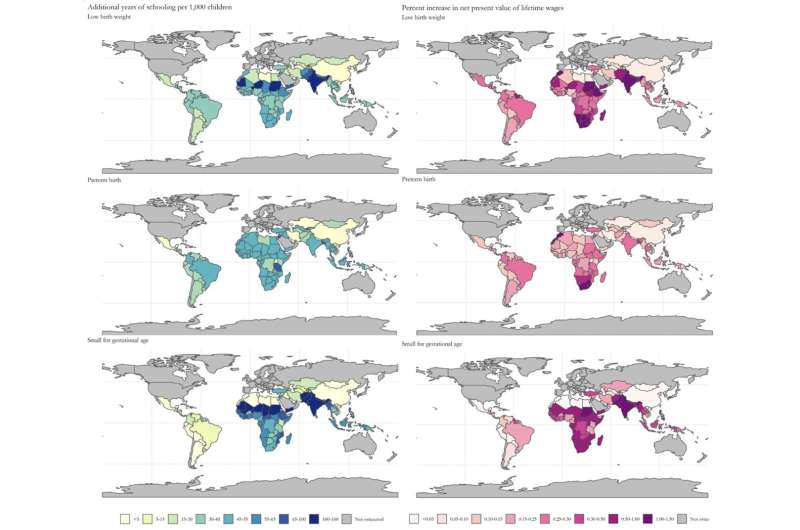Preventing adverse birth outcomes could boost education, income

Reducing the excess prevalence of low birthweight, preterm birth or small-for-gestational-age birth in low- and middle-income countries may lead to substantial long-term human capital gains when it comes to both long-term schooling and lifetime income gains, according to a new study published this week in the open-access journal PLOS Global Public Health by Mia Blakstad of Harvard TH Chan School of Public Health, U.S.A., and colleagues.
Globally, it is estimated that 14.6% of all live births are low birthweight, 10.6% are preterm and 27.0% are small-for-gestational-age. While the global contribution of adverse birth outcomes to child morbidity and mortality is well documented, the potential long-term schooling and economic consequences have been less well studied.
In the new study, the researchers used previously collected data on birth outcomes and population demographics from a number of open-access sources and previous studies. They modeled the potential impact of reducing adverse birth outcomes to theoretically possible minimums across 121 low- and middle-income countries.
The team calculated that, across the 121 countries, reducing low birthweight to the theoretical minimum of 3.2% could lead to an additional 20.3 million school years (95% CI: 6.0,34.8) and US$ 68.8 billion (95% CI: 20.3,117.9) in lifetime income gains per birth cohort. Reducing preterm birth to 5.5% could lead to estimated gains of 9.8 million school years (95% CI: 1.5,18.4) and US$ 41.9 billion (95% CI: 6.1,80.9) in lifetime income. And reducing small-for-gestational age births to 10% could contribute 39.5 million (95% CI: 19.1,60.3) school years and US$ 113.6 billion (95% CI: 55.5,174.2) in lifetime income gained. Gains varied between regions, with some of the largest gains in both educational attainment and lifetime earnings seen in South Asia and Sub-Saharan Africa.

The authors conclude that the impacts of interventions to improve birth outcomes have far-reaching effects beyond the more immediate benefits on child mortality, growth and development, and could provide substantial population-level human capital returns.
The authors add: "We found that global investment to reduce the number of babies born too soon or too small today may return billions of dollars in workforce earnings in the future."
More information: Large gains in schooling and income are possible from minimizing adverse birth outcomes in 121 low- and middle-income countries: A modelling study, PLOS Global Public Health (2022). DOI: 10.1371/journal.pgph.0000218





















